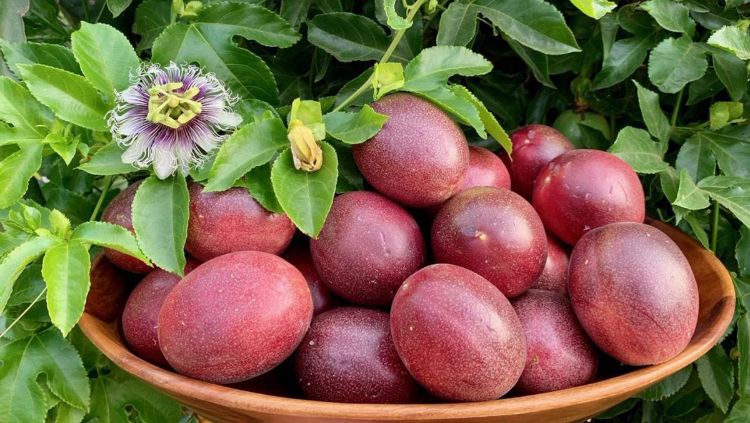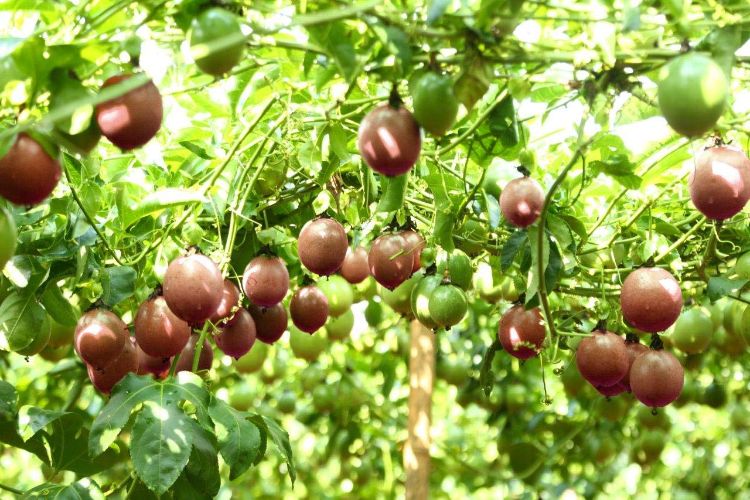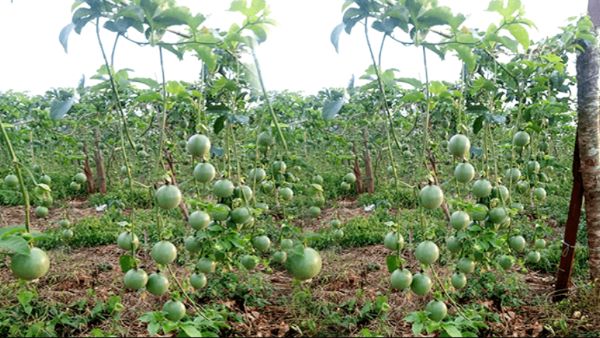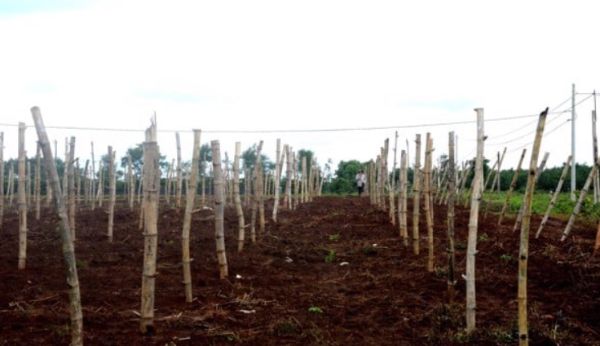PASSION FRUIT PULP

Mùa khô ở Tây Nguyên trời nắng nóng kéo dài, nhiệt độ tăng cao khiến cho cây chanh leo thường xuyên rơi vào tình trạng thiếu nước. Do đó, bà con cần tưới nước đầy đủ và kịp thời để cây chanh leo sinh trưởng và phát triển tốt, hạn chế ảnh hưởng của thời tiết gây ra. Khi cây chanh leo bị thiếu nước quả sẽ bị mềm, vỏ bị nhăn nheo, tỷ lệ đậu hoa kém, năng suất cây trồng giảm.
Để tưới nước cho cây chanh leo đạt hiệu quả cao vào mùa khô, bà con cần áp dụng các biện pháp như sau:
- Thường xuyên kiểm tra độ ẩm của đất bằng cách quan sát, kiểm tra bề mặt đất trồng. Đảm bảo đất không bị khô.
- Tưới nước vào buổi sáng sớm hoặc buổi chiều muộn. Tránh tưới nước vào buổi trưa vì nhiệt độ cao, trời nắng nóng sẽ gây ra hiện tượng sốc nhiệt gây ảnh hưởng cho cây chanh leo.
- Nên tưới nhỏ giọt kết hợp tưới bằng béc phun mưa trên cao là biện pháp hiệu quả vì vừa tiết kiệm nước, vừa cung cấp lượng nước kịp thời cho cây chanh leo.
Vạn Xuân Agri hy vọng những thông tin này sẽ giúp ích cho quá trình nhà nông chăm sóc cây chanh leo. Bà con đang có nhu cầu tìm hiểu và đặt mua giống chanh dây chất lượng, uy tín, nguồn gốc rõ ràng, vui lòng truy cập TẠI ĐÂY.
Hoặc bà con cũng có thể liên hệ trực tiếp đến hotline: 0862.4567.55 – 079.248.7777 để được các nhân viên của Vạn Xuân Agri tư vấn về loại giống cây phù hợp nhất.

Chiều 29/3, Sở Nông nghiệp và Phát triển nông thôn, Liên minh hợp tác xã tỉnh Gia Lai và Công ty cổ phần Nafoods Group đã tiến hành ký kết Biên bản ghi nhớ hợp tác về phát triển chanh leo và rau quả theo Đề án phát triển sản xuất rau, hoa và cây ăn quả trên địa bàn tỉnh Gia Lai đến năm 2030, định hướng đến năm 2040.
Theo ông Lưu Trung Nghĩa, Giám đốc Sở Nông nghiệp và Phát triển nông thôn tỉnh Gia Lai, tính đến đầu năm 2023, diện tích chanh leo khoảng trên 4.000 ha; diện tích cho sản phẩm hơn 3.000 ha; năng suất bình quân đạt 451,5 tạ/ha; sản lượng đạt gần 150.000 tấn. Dự kiến đến năm 2025, diện tích chanh leo trên địa bàn tỉnh khoảng 20.000 ha. Cây chanh leo trồng chủ yếu ở các huyện như Chư Prông gần 822 ha, Ia Grai 650 ha, Đăk Đoa 620 ha, Chư Sê 507,7 ha, Chư Păh 500 ha, Mang Yang 382 ha, K’bang 239 ha.
Theo đánh giá của ngành nông nghiệp tỉnh Gia Lai, với chi phí đầu tư bình quân cho 1 ha chanh leo khoảng 160 – 170 triệu đồng. Sau khi trồng 8 – 9 tháng, chanh leo cho thu hoạch lứa quả đầu tiên, đến tháng 11 – 12 cho thu hoạch lứa quả thứ hai, đến tháng thứ 14 cho thu hoạch lứa quả thứ 3 và thu mót, dọn vườn vào khoảng tháng 16, 17 sau khi trồng. Năng suất chanh leo bình quân khoảng 40 – 45 tấn/ha. Giá bán bình quân hiện nay khoảng 12.500 đồng/kg. Sau khi trừ chi phí, lợi nhuận thu được khoảng 360 – 370 triệu đồng/ha.
Ông Nguyễn Mạnh Hùng, Tổng Giám đốc Nafoods Gruop cho biết, hiện tại trên thị trường có nhiều cơ sở sản xuất giống khác nhau, tuy nhiên cây giống của Nafoods được sản xuất ra đảm bảo ổn định về năng suất và chất lượng, đặc biệt là quản lý virus trên cây giống. Nafoods là đơn vị sản xuất giống chanh leo duy nhất tại Việt Nam làm chủ công nghệ phân tích phân tử kiểm nghiệm virus trên cây chanh leo.
Qua 9 năm đưa cây giống đưa cây giống ra thị trường, từ quy mô 200.000 cây giống/năm, đến nay doanh nghiệp đang cung ứng ra thị trường 12 triệu cây giống/năm, chiếm 60% thị phần giống chanh leo Việt Nam. Hiện nay giống chanh leo Nafoods được bà con nông dân tin tưởng sử dụng về năng suất và chất lượng đáp ứng thị trường từ quả tươi đến phục vụ chế biến.
Ông Nguyễn Thế Hùng, Chủ tịch Liên minh hợp tác xã tỉnh Gia Lai hy vọng biến Gia Lai thành thủ phủ chanh leo tím, phát triển chanh leo thành cây chủ lực. Tuy nhiên, để cây chanh leo phát triển bền vững, có đầu ra ổn định, nhất thiết cần phải chú trọng khâu tổ chức kết nối giữa doanh nghiệp – hợp tác xã với nông dân, từ khâu giống, phân bón, thu mua, chế biến và xuất khẩu.
Đại diện Viện bảo vệ thực vật (Viện khoa học Nông nghiệp Việt Nam) cho rằng, chanh leo không phải là cây trồng mới, tuy nhiên do sâu bệnh nên cây chanh leo chưa đạt hiệu quả mong muốn. Qua nghiên cứu, tìm hiểu, lý do là cây chanh leo bị nhiễm bệnh virus như trùng ngọn, xoăn lá, thối phình, vàng lá… Đề xuất để đảm bảo sản xuất cây chanh leo an toàn cần chú trọng phát triển xây dựng nhiều vườn cây đầu dòng được giám định sạch bệnh. Bà con trước khi trồng, mua giống có chứng nhận chất lượng. Sau đó phải bám sát quy trình sống của cây để phát hiện sớm sâu bệnh nếu có, phối hợp với Chi cục Bảo vệ thực vật tỉnh để phòng ngừa sâu bệnh trên cây chanh leo.
Sau khi tìm hiểu năng lực, tiềm năng và nhu cầu thực tế, các bên thống nhất ký kết Bản ghi nhớ về hợp tác phát triển chanh leo trên địa bàn tỉnh theo Đề án phát triển sản xuất rau, hoa và cây ăn quả trên địa bàn tỉnh Gia Lai đến năm 2030, định hướng đến năm 2040, thời gian thực hiện từ năm 2023 – 2026.
Biên bản ghi nhớ tập trung tham vấn thành lập “Hiệp hội chanh leo và rau quả tỉnh Gia Lai”; xúc tiến đề xuất xây dựng Trung tâm kiểm nghiệm, xây dựng chỉ dẫn địa lý chanh leo Gia Lai. Đồng thời tư vấn, hướng dẫn về đảm bảo an toàn vệ sinh thực phẩm trong sản xuất, chế biến chanh leo; việc quản lý chất lượng cây giống các cơ sở sản xuất giống chanh leo trên địa bàn.
Công ty Cổ phần Nafoods Group hỗ trợ cơ quan chức năng về kiểm tra, kiểm nghiệm chất lượng cây giống, đặc biệt là kiểm nghiệm về virus trên cây giống chanh leo. Cùng đó, các bên xây dựng các chương trình, mô hình khuyến nông về cây chanh leo có tính lan tỏa cao đến được người dân vùng sâu, vùng xa thông qua mạng lưới khuyến nông địa phương với các chương trình tư vấn canh tác, phòng chống sâu bệnh lưu động hoặc các buổi tọa đàm trên truyền hình, trên các nền tảng số. Ngoài ra, các bên cũng phối hợp tham mưu tổ chức lễ xuất lô hàng chanh leo chính ngạch đầu tiên sang thị trường Trung Quốc.
Biên bản ghi nhớ cũng đề cập đến việc phối hợp với các địa phương giới thiệu các hợp tác xã trên địa bàn tỉnh Gia Lai tham gia hợp tác, liên kết với Công ty cổ phần Nafoods; tư vấn, vận động các hợp tác xã về phát triển vùng nguyên liệu và hình thành chuỗi liên kết sản xuất và tiêu thụ chanh leo trên địa bàn tỉnh; triển khai xây dựng Dự án “Ứng dụng công nghệ số hóa trong quản lý và phát triển chuỗi giá trị vùng trồng chanh leo gắn mô hình Khuyến nông – Hợp tác xã thông minh”.
Biên bản ghi nhớ cũng đề cập đến vấn đề làm việc với các địa phương, hợp tác xã, tổ hợp tác để thỏa thuận ký hợp đồng liên kết sản xuất gắn với tiêu thụ chanh leo trên địa bàn tỉnh; chủ động ký hợp đồng cung ứng giống, vật tư, hỗ trợ kỹ thuật canh tác và ứng dụng số hóa trong quản lý và phát triển vùng trồng, hợp đồng bao tiêu nông sản với các hợp tác xã, tổ hợp tác, đảm bảo chất lượng.
Đồng thời, xúc tiến xây dựng Trung tâm giống công nghệ cao trên cơ sở sắp xếp lại trung tâm giống hiện có của Công ty cổ phần Nafoods Group và của các bên, kêu gọi sự đầu tư thêm từ bên ngoài về công nghệ, khoa học kỹ thuật, nguồn lực tài chính, thị trường và cơ chế chính sách phù hợp.
(Nguồn: Báo Tin Tức)

Trồng chanh dây hữu cơ đang là xu hướng chung của giới nông dân hiện nay. Vì sao vậy? Bởi vì cây này rất dễ trồng và chăm sóc, mang lại hiệu quả kinh tế cao. Các nông dân ở Việt Nam cũng đang mở rộng sản xuất chanh dây để xuất khẩu ra thế giới. Nhưng để cây chanh dây đạt tiêu chuẩn cao và đạt yêu cầu của khách hàng, thì việc trồng và chăm sóc cần phải thật kỹ lưỡng. Dưới đây là những kỹ thuật trồng chanh dây hữu cơ đủ tiêu chuẩn xuất khẩu mà bạn có thể tham khảo nhé.
Các tiêu chuẩn cần có để trồng chanh dây hữu cơ
Để trồng chanh dây hữu cơ thành công, có 3 yếu tố mà các chuyên gia của Vạn Xuân Agri khuyên bạn cần nhớ:
Yêu cầu về khí hậu và đất đai:
Chanh dây phù hợp với khí hậu nhiệt đới, cận nhiệt đới, nên thích hợp với khí hậu ở Việt Nam. Cây cần được trồng ở nơi có nhiệt độ trung bình từ 18 đến 30 độ C, đủ ánh sáng và khuất gió. Vùng Tây Nguyên là một trong những nơi phù hợp nhất để trồng chanh dây. Đất đai phù hợp cho chanh dây là từ đất đỏ bazan, feralit, đất thịt nhẹ đến đất cát cổ, với pH từ 5.5 – 6.0 và khả năng thoát nước tốt.
Lựa chọn giống chanh dây hữu cơ phù hợp:
Hiện nay trên thị trường có nhiều loại giống chanh dây để bạn lựa chọn. Cần lựa chọn giống cây tốt, đảm bảo chất lượng, có bao bì, nhãn mác rõ ràng, xuất xứ để đảm bảo cây giống sạch bệnh, có sức chống chịu tốt và hạn chế các loại côn trùng phổ biến.
Thời gian trồng cây:
Chanh dây có thể xuống giống vào bất kỳ thời điểm nào trong năm vì dễ trồng và chăm sóc. Thời điểm thích hợp nhất là từ tháng 4 đến tháng 6 dương lịch hằng năm, vào mùa mưa ở Tây Nguyên để cây phát triển tốt hơn.
Hướng dẫn chuẩn bị đất trồng chanh dây hữu cơ
Để trồng cây chanh dây hữu cơ thành công, bạn cần chuẩn bị lớp đất mịn, tơi xốp trên bề mặt bằng cách trộn đều với 1 ít phân chuồng đã ủ hoai mục hoặc 1 ít phân lân. Tuy nhiên, bạn cần hạn chế sử dụng quá nhiều phân để tránh làm cháy rễ cây con. Sau khi đào hố, bạn cần rắc vôi và đảo đều để xử lý đất trong khoảng 1 tháng.
Mật độ trồng chanh dây hữu cơ phụ thuộc vào địa hình, loại đất và loại dàn, nhưng mật độ thích hợp là 3 x 3m. Nếu trồng xen cây chanh dây với các loại cây khác, mật độ có thể duy trì ở mức 5 x 5m, 5 x 4m hoặc 5 x 4m.
Khi đất đã đủ độ ẩm hoặc đã chuẩn bị hệ thống tưới, bạn cần bỏ 1 gốc từ 0.5-1kg phân lân đã đảo đều rồi tiến hành trồng. Để phòng chống ngập úng vào mùa mưa, hãy chú ý trồng cao hơn bề mặt hố. Bạn cũng nên mua ly nhựa chụp lại cho cây để hạn chế bị dế cắn và đổ thuốc Bio ngay sau khi trồng để phòng trừ sùng mối.
Trong mùa mưa, bạn nên phun phòng nấm bệnh cho cây 3 ngày 1 lần. Để cây phát triển tốt, hãy bón 1-2 lần NPK trong tháng và bổ sung phân hữu cơ cho cây 1 lần mỗi tháng. Đến giai đoạn chia cành, nuôi hoa trái, hãy bổ sung các dòng phân làm bông, trung vi lượng, và các loại phân khác cho cây.

Cách chăm cây chanh dây lớn nhanh và khỏe mạnh
Để chăm sóc cây chanh dây đúng cách, bạn cần thực hiện các công việc sau:
Tưới nước định kỳ: Chanh dây cần được tưới nước thường xuyên để giữ độ ẩm đất và giúp cây phát triển tốt hơn. Tuy nhiên, không nên tưới quá nhiều nước để tránh gây ngập úng cho cây.
Bón phân định kỳ: Bón phân là cách giúp cây chanh dây phát triển và sinh trưởng tốt hơn. Bạn có thể sử dụng các loại phân bón hữu cơ như phân chuồng hoặc phân hữu cơ khác để bón cho cây.
Kiểm tra và điều trị sâu bệnh: Các loài sâu bệnh như sâu cuốn lá, sâu đục thân và bệnh gỉ sắt có thể gây hại cho cây chanh dây. Kiểm tra thường xuyên và sử dụng thuốc trừ sâu để điều trị nếu thấy có sự xuất hiện của chúng.
Cắt tỉa: Việc cắt tỉa thường xuyên giúp loại bỏ các cành già yếu và không hiệu quả, tạo điều kiện cho sự phát triển của các cành mới và khích lệ cây sản xuất hoa và trái khi trồng cây chanh dây hữu cơ. Khi cành già được loại bỏ, các cành non mới có thể phát triển với tốc độ nhanh hơn và phân bố đều trên mặt giàn, tạo ra một cấu trúc cây đồng đều và dễ quản lý hơn. Vào mùa mưa, việc cắt tỉa được coi là một hoạt động quan trọng để giảm thiểu sự lây lan của sâu bệnh và nấm mốc trên cây.
Tỉa bớt lá cũng giúp tăng cường độ sáng và thông gió trong giàn cây, giúp cho quá trình quang hợp diễn ra hiệu quả hơn. Sau khi thu hoạch, việc cắt tỉa đúng cách là quan trọng để duy trì sức khỏe của cây chanh dây và giúp nó phục hồi nhanh chóng sau quá trình sinh trưởng và sản xuất trái.
Nên cắt hết các cành trên mặt giàn đã cho trái để giảm tải trọng trên cây và tạo điều kiện cho cành mới phát triển. Để lại thân và các cành từ mặt đất tới giàn để giữ cho cây có độ dài phát triển và cho phép cây phục hồi nhanh chóng. Nếu cây chanh dây không được đốn tỉa hoàn toàn vào cuối năm, nó có thể gặp các vấn đề về sinh trưởng và phát triển. Các cành già yếu sẽ cản trở sự phát triển của các cành mới và làm hạn chế đến năng suất của cây.
Điều chỉnh ánh sáng: Cây chanh dây thích ánh sáng mạnh và nhiều. Nếu cây được trồng trong khu vực không có đủ ánh sáng tự nhiên, bạn nên sử dụng đèn LED hoặc đèn phát sáng khác để hỗ trợ cho cây.
Chăm sóc định kỳ: Bạn cần thường xuyên bảo vệ cây chanh dây khỏi sâu bệnh và cung cấp đủ dinh dưỡng cần thiết cho cây để giúp cây phát triển tốt hơn.
Tóm lại, việc chăm sóc cây chanh dây đúng cách sẽ giúp cây phát triển tốt hơn và cho ra năng suất cao. Ngoài ra, bạn cần thường xuyên kiểm tra và xử lý kịp thời các vấn đề về sâu bệnh, ánh sáng, đất và nước để đảm bảo sức khỏe cũng như sự phát triển của cây.
Ngoài ra, bạn cũng có thể nghiên cứu thêm một số thông tin về giống chanh dây năng suất cao trước khi bắt đầu đặt mua sản phẩm.
Nên lựa chọn giống chanh dây ở đâu?
Nếu bạn là một người nông dân đang tìm kiếm giống cây chanh dây chất lượng và đảm bảo nguồn gốc, hãy đến với Vạn Xuân Agri – đơn vị chuyên cung cấp giống cây chanh dây uy tín và chất lượng. Chúng tôi cam kết cung cấp cho bạn những giống cây chanh dây tốt nhất để trồng theo phương pháp hữu cơ như Nafoods 1, Đài Nông 1,… Giúp bạn thu hoạch được nhiều sản phẩm chất lượng cao và giá trị kinh tế cao hơn. Hãy liên hệ ngay với chúng tôi để được tư vấn và đặt hàng!
- Địa chỉ: Thôn 6, xã Trúc Sơn, huyện Cư Jút, tỉnh Đắk Nông
- Hotline: 0862.4567.55 hoặc 079.248.7777
- Email: info@vanxuanagri.com
